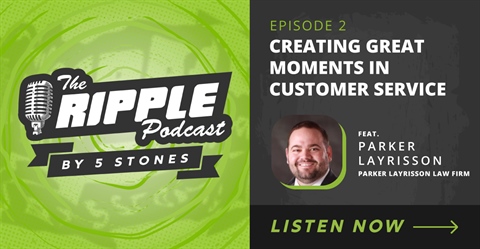In episode 2 of The Ripple Podcast by 5 Stones, Kim talks with Parker Layrisson about creating great moments in customer service.
Parker is a personal injury attorney in Ponchatoula, LA. He owns Parker Layrisson Law Firm. In a world of personal injury attorneys who beat their chests and buy billboards of themselves standing on the hoods of 18 wheelers, Parker chooses to be very different.
In this episode you’re going to hear Parker’s “why” behind the amazing way he treats his clients. You’ll also get to hear from he and Kim about their favorite customer service experiences.
Find Parker online at:
Resources mentioned in this episode:
- Book: Start With Why
- Book: The Go-Giver
